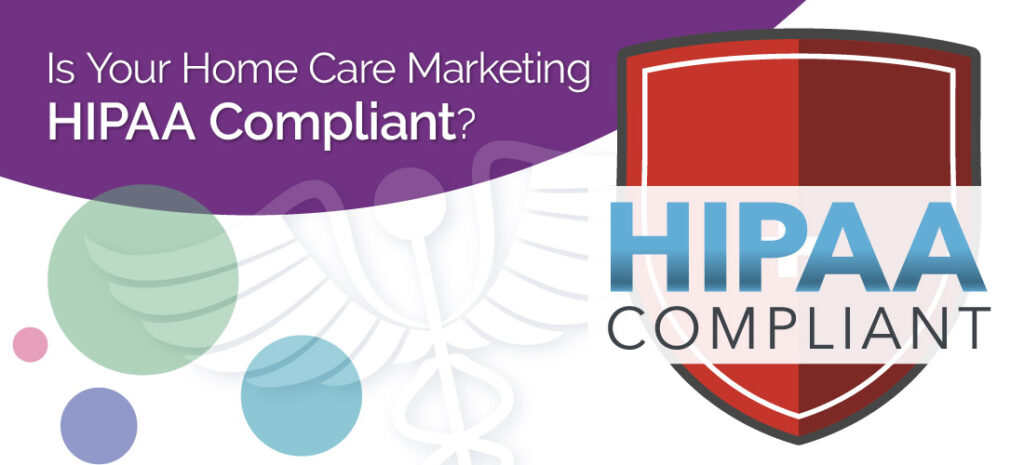
As a home care agency owner, you’re undoubtedly familiar with HIPAA, the Health Insurance Portability and Accountability Act of 1996. While most home care agencies recognize that HIPAA governs how to handle sensitive patient information internally, fewer understand how HIPAA also applies specifically to marketing and digital outreach.
The HIPAA Privacy Rule controls how protected health information (PHI) can be used in marketing efforts. Any misuse or accidental disclosure can put your agency at serious risk of penalties or legal complications. That’s why your marketing strategy must always align with HIPAA guidelines.
What Exactly Is Protected Health Information (PHI)?
PHI is defined as individually identifiable health information that connects a person’s identity to their health status, treatment, or payment details. Under HIPAA guidelines, any of the following data points, when linked to health or medical information, constitute PHI:
- Names (full, partial, initials)
- Geographic identifiers (street address, city, county, ZIP code—anything smaller than state level)
- Dates related to health (birth, admission, discharge, death)
- Contact information (telephone numbers, emails, fax numbers)
- Social Security numbers and driver’s license details
- Medical records, health plan numbers, and insurance information
- Vehicle and device identifiers (license plates, serial numbers)
- IP addresses and URLs
- Biometric data (fingerprints, voiceprints)
- Photos, particularly full-face images or similar
- Any other information that could reasonably identify an individual
Common HIPAA Pitfalls in Home Care Marketing—and How to Avoid Them
Your Agency’s Website
Websites frequently become the epicenter of HIPAA compliance concerns. Here’s how to safeguard your agency online:
- Contact Forms: Limit form fields strictly to basic contact information. Avoid fields inviting detailed health information. If a comments section must be included, clearly state in your disclaimer that visitors should not disclose specific health conditions or diagnoses.
- Data Storage: All data collected from online forms should be securely stored in an encrypted, regularly backed-up system independent of your website, such as a HIPAA-compliant CRM.
- Blog and Comment Sections: It is possible to disable all commenting features, as allowing open comments could inadvertently expose PHI if visitors share personal details. However, because engagement can be beneficial for blogs, you might consider moderating comments manually or use filtering tools to catch PHI disclosures.
- Security Measures: Ensure your website uses HTTPS, which encrypts data exchanges between your visitors and your site, significantly improving security.
Social Media Marketing
Social media can significantly boost your agency’s visibility and reach—but careful handling is essential to avoid accidental PHI disclosures:
- Client Photos: Never post images of clients without explicit written consent. Even photos that obscure identities can accidentally contain identifiable details. If permission is obtained, keep posts general—never associate photos with specific medical conditions or treatments.
- Posts and Messaging: Avoid language in posts that encourages followers to disclose health information about themselves or loved ones. Additionally, never use social media messaging to exchange client-specific information, as these platforms aren’t secure.
- Social Media Policy: Maintain a clear, written social media policy for your staff, including instructions on their personal accounts, ensuring no identifiable client information is shared.
Email Marketing
Email is an effective marketing tool, but can pose risks if not managed properly:
- Data Storage and Handling: Store email lists and client information securely in encrypted, regularly backed-up databases, separate from less secure storage.
- Segmentation of Lists: If you segment your email audience based on medical conditions or other sensitive criteria, clients must explicitly opt-in to these segmented lists.
- Encryption: Use encrypted email systems to ensure only intended recipients can read sensitive information.
- Business Associate Agreements (BAA): Any third-party email marketing provider you partner with must execute a BAA, guaranteeing compliance and protection of PHI.
Simple Solutions to Ensure HIPAA Compliance in Marketing:
- Use third-party vendors specializing in HIPAA-compliant technology solutions.
- Clearly detail your agency’s data collection policies within your website’s privacy policy and terms of use.
- Regularly train your staff on HIPAA compliance and security best practices.
Stay Compliant with Help from corecubed
At corecubed, we help home care agencies effectively market their services while maintaining strict compliance with HIPAA regulations. With deep industry expertise, we understand how to balance engaging marketing with robust security measures, protecting both your clients and your agency’s reputation.
If your agency needs professional guidance on marketing strategies that keep you compliant and secure, call us at 800.370.6580 or contact us online to learn more.
